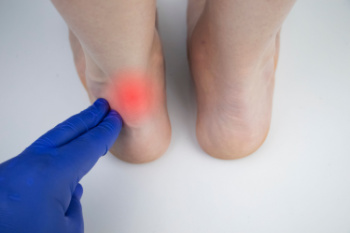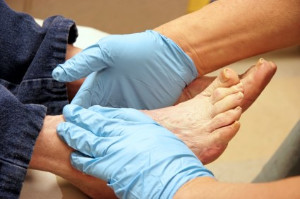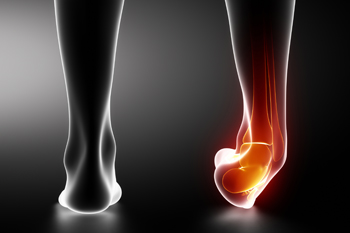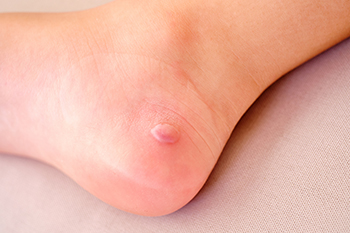
(616) 846-3400
Fax: (616) 846-3406

(616) 846-3400
Fax: (616) 846-3406

Pain and burning sensations in the Achilles tendon often stem from various causes related to overuse and strain. Repetitive activities, especially those involving running or jumping, can lead to inflammation known as Achilles tendinitis. This condition arises when the tendon, connecting the calf muscles to the heel bone, becomes irritated from excessive stress. Another common issue is Achilles tendinosis, where chronic degeneration of the tendon tissue causes discomfort and a burning feeling. Tight calf muscles and wearing improper footwear can also contribute to tendon pain. To address these issues, it is vital to rest the affected area, and incorporate stretching exercises to improve flexibility. If you have pain in your calf, it is suggested that you consult a podiatrist who can accurately diagnose Achilles tendon injuries, and offer effective treatment methods.
Achilles tendon injuries need immediate attention to avoid future complications. If you have any concerns, contact Dr. Robbi Young of Grand Haven Foot & Ankle. Our doctor can provide the care you need to keep you pain-free and on your feet.
What Is the Achilles Tendon?
The Achilles tendon is a tendon that connects the lower leg muscles and calf to the heel of the foot. It is the strongest tendon in the human body and is essential for making movement possible. Because this tendon is such an integral part of the body, any injuries to it can create immense difficulties and should immediately be presented to a doctor.
What Are the Symptoms of an Achilles Tendon Injury?
There are various types of injuries that can affect the Achilles tendon. The two most common injuries are Achilles tendinitis and ruptures of the tendon.
Achilles Tendinitis Symptoms
Rupture Symptoms
Treatment and Prevention
Achilles tendon injuries are diagnosed by a thorough physical evaluation, which can include an MRI. Treatment involves rest, physical therapy, and in some cases, surgery. However, various preventative measures can be taken to avoid these injuries, such as:
If you have any questions please feel free to contact our office located in Grand Haven, MI . We offer the newest diagnostic tools and technology to treat your foot and ankle needs.

People with diabetes need to prioritize foot care to prevent complications such as infections, ulcers, and gangrene, which can sometimes result in severe outcomes. Nerve and blood vessel damage from high blood sugar can lead to decreased sensation and poor circulation in the feet. Foot care tips for diabetics include daily inspection of the feet for cuts, blisters, and abnormalities is essential. Wearing properly fitting shoes and socks is also important, as it helps protect against injuries and discomfort that might go unnoticed due to reduced sensation. Maintaining good blood sugar control is vital to promote healing and prevent infections. Additionally, washing feet daily with warm water, ensuring they are thoroughly dried, and moisturizing them can help maintain skin health. It is advisable to walking barefoot and to engage in regular physical activity to improve circulation. If any foot issues arise, a podiatrist can offer specialized care of your feet. If you have diabetes, it is suggested that you schedule regular appointments with a podiatrist for ongoing foot treatment.
Diabetic foot care is important in preventing foot ailments such as ulcers. If you are suffering from diabetes or have any other concerns about your feet, contact Dr. Robbi Young from Grand Haven Foot & Ankle. Our doctor can provide the care you need to keep you pain-free and on your feet.
Diabetic Foot Care
Diabetes affects millions of people every year. The condition can damage blood vessels in many parts of the body, especially the feet. Because of this, taking care of your feet is essential if you have diabetes, and having a podiatrist help monitor your foot health is highly recommended.
The Importance of Caring for Your Feet
Patients with diabetes should have their doctor monitor their blood levels, as blood sugar levels play such a huge role in diabetic care. Monitoring these levels on a regular basis is highly advised.
It is always best to inform your healthcare professional of any concerns you may have regarding your feet, especially for diabetic patients. Early treatment and routine foot examinations are keys to maintaining proper health, especially because severe complications can arise if proper treatment is not applied.
If you have any questions please feel free to contact our office located in Grand Haven, MI . We offer the newest diagnostic and treatment technologies for all your foot and ankle needs.

Ankle dislocations are serious injuries where the bones in this complex joint lose their proper alignment. An ankle dislocation usually involves the shin bone, or tibia, and the foot bone, or talus, coming apart. Often, this injury is accompanied by breaks in the lower parts of the shin bones and damage to the ligaments that keep the ankle stable. In rare cases, just the ligaments can be injured, causing dislocation. These injuries are typically caused by trauma such as falls, car accidents, or sports injuries. The direction of dislocation depends on how the foot is positioned and the force applied. For example, when the foot points downward, the ankle might dislocate backwards. Twisting injuries can cause the ankle to dislocate sideways. Dislocations are very painful. They often cause visible deformity, swelling, bruising, and possible numbness or tingling if nerves are affected. Standing or walking is often impossible. If you believe your ankle may be dislocated, it is suggested that you make an emergency appointment with a podiatrist for an exam and treatment.
Ankle pain can have many different causes and the pain may potentially be serious. If you have ankle pain, consult with Dr. Robbi Young from Grand Haven Foot & Ankle. Our doctor will assess your condition and provide you with quality foot and ankle treatment.
Ankle pain is any condition that causes pain in the ankle. Due to the fact that the ankle consists of tendons, muscles, bones, and ligaments, ankle pain can come from a number of different conditions.
Causes
The most common causes of ankle pain include:
Symptoms
Symptoms of ankle injury vary based upon the condition. Pain may include general pain and discomfort, swelling, aching, redness, bruising, burning or stabbing sensations, and/or loss of sensation.
Diagnosis
Due to the wide variety of potential causes of ankle pain, podiatrists will utilize a number of different methods to properly diagnose ankle pain. This can include asking for personal and family medical histories and of any recent injuries. Further diagnosis may include sensation tests, a physical examination, and potentially x-rays or other imaging tests.
Treatment
Just as the range of causes varies widely, so do treatments. Some more common treatments are rest, ice packs, keeping pressure off the foot, orthotics and braces, medication for inflammation and pain, and surgery.
If you have any questions, please feel free to contact our office located in Grand Haven, MI . We offer the newest diagnostic and treatment technologies for all your foot care needs.

Playing tennis can be tough on the feet due to the high-impact movements and frequent lateral actions that can often lead to painful blisters. These blisters result from the friction between the skin and footwear, which is inevitable during extended matches. While preventive measures like wearing moisture-wicking socks and properly fitted shoes can reduce the risk, sometimes blisters still develop. When this happens, it may help to consult a podiatrist. This foot doctor can provide professional treatment to alleviate pain and promote healing, ensuring you will not have to pause your tennis activities for long. Specialized padding techniques, specific footwear adjustments, or custom orthotics may be offered to minimize future friction. A podiatrist also can provide personalized advice tailored to your specific foot structure and playing style, which can help prevent blisters from recurring. If you frequently develop blisters on the feet, it is suggested that you schedule an appointment with a podiatrist for effective treatment and prevention methods.
Blisters may appear as a single bubble or in a cluster. They can cause a lot of pain and may be filled with pus, blood, or watery serum. If your feet are hurting, contact Dr. Robbi Young of Grand Haven Foot & Ankle. Our doctor can provide the care you need to keep you pain-free and on your feet.
Foot Blisters
Foot blisters are often the result of friction. This happens due to the constant rubbing from shoes, which can lead to pain.
What Are Foot Blisters?
A foot blister is a small fluid-filled pocket that forms on the upper-most layer of the skin. Blisters are filled with clear fluid and can lead to blood drainage or pus if the area becomes infected.
Symptoms
(Blister symptoms may vary depending on what is causing them)
Prevention & Treatment
In order to prevent blisters, you should be sure to wear comfortable shoes with socks that cushion your feet and absorb sweat. Breaking a blister open may increase your chances of developing an infection. However, if your blister breaks, you should wash the area with soap and water immediately and then apply a bandage to the affected area. If your blisters cause severe pain it is important that you call your podiatrist right away.
If you have any questions, please feel free to contact our office located in Grand Haven, MI . We offer the newest diagnostic and treatment technologies for all your foot care needs.